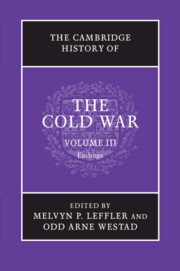Book contents
- Frontmatter
- 1 The Cold War and the intellectual history of the late twentieth century
- 2 The world economy and the Cold War, 1970–1990
- 3 The rise and fall of Eurocommunism
- 4 The Cold War and Jimmy Carter
- 5 Soviet foreign policy from détente to Gorbachev, 1975–1985
- 6 Islamism, the Iranian revolution, and the Soviet invasion of Afghanistan
- 7 The collapse of superpower détente, 1975–1980
- 8 Japan and the Cold War, 1960–1991
- 9 China and the Cold War after Mao
- 10 The Cold War in Central America, 1975–1991
- 11 The Cold War and southern Africa, 1976–1990
- 12 The Gorbachev revolution and the end of the Cold War
- 13 US foreign policy under Reagan and Bush
- 14 Western Europe and the end of the Cold War, 1979–1989
- 15 The East European revolutions of 1989
- 16 The unification of Germany, 1985–1991
- 17 The collapse of the Soviet Union, 1990–1991
- 18 Science, technology, and the Cold War
- 19 Transnational organizations and the Cold War
- 20 The biosphere and the Cold War
- 21 The Cold War and human rights
- 22 The Cold War in the longue durée: global migration, public health, and population control
- 23 Consumer capitalism and the end of the Cold War
- 24 An ‘incredibly swift transition’: reflections on the end of the Cold War
- 25 The restructuring of the international system after the Cold War
- Bibliographical essay
- Index
- References
21 - The Cold War and human rights
Published online by Cambridge University Press: 28 September 2010
- Frontmatter
- 1 The Cold War and the intellectual history of the late twentieth century
- 2 The world economy and the Cold War, 1970–1990
- 3 The rise and fall of Eurocommunism
- 4 The Cold War and Jimmy Carter
- 5 Soviet foreign policy from détente to Gorbachev, 1975–1985
- 6 Islamism, the Iranian revolution, and the Soviet invasion of Afghanistan
- 7 The collapse of superpower détente, 1975–1980
- 8 Japan and the Cold War, 1960–1991
- 9 China and the Cold War after Mao
- 10 The Cold War in Central America, 1975–1991
- 11 The Cold War and southern Africa, 1976–1990
- 12 The Gorbachev revolution and the end of the Cold War
- 13 US foreign policy under Reagan and Bush
- 14 Western Europe and the end of the Cold War, 1979–1989
- 15 The East European revolutions of 1989
- 16 The unification of Germany, 1985–1991
- 17 The collapse of the Soviet Union, 1990–1991
- 18 Science, technology, and the Cold War
- 19 Transnational organizations and the Cold War
- 20 The biosphere and the Cold War
- 21 The Cold War and human rights
- 22 The Cold War in the longue durée: global migration, public health, and population control
- 23 Consumer capitalism and the end of the Cold War
- 24 An ‘incredibly swift transition’: reflections on the end of the Cold War
- 25 The restructuring of the international system after the Cold War
- Bibliographical essay
- Index
- References
Summary
Neither the course nor the ending of the Cold War can be understood without some reference to the impact that human rights ideas had on East–West rivalries. Whereas Communist governments regarded civil and political rights as bourgeois trappings, stating a preference instead for the collective rights appropriate to the social and economic goals they propounded, Western liberal capitalist governments gave priority precisely to those rights that the Soviet bloc derided. These divisions in interpretation were crucial because of the way they related to the broader contest. They were ’not mere preferences which outsiders could take or leave’, but were powerful emblems of success on the ideological battleground. The gaining of adherents to one interpretation over another signalled victory for one and defeat for the other – outcomes that, in turn, could strengthen or undermine the domestic legitimacy of their competing political systems.
This particular aspect of the Cold War struggle had both positive and negative results for the promotion and protection of human rights. Rhetorical arguments about the priorities to be given to certain values helped to sustain attention to the human rights idea, even as actual behaviour could prove devastating for human rights protections. Similarly, some of the seeds of the ending of the Cold War germinated as a result of the disillusion of those who experienced the double standards and the failures to promote the conditions under which those protections could advance.
- Type
- Chapter
- Information
- The Cambridge History of the Cold War , pp. 445 - 465Publisher: Cambridge University PressPrint publication year: 2010
References
- 31
- Cited by

